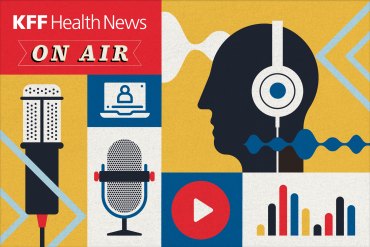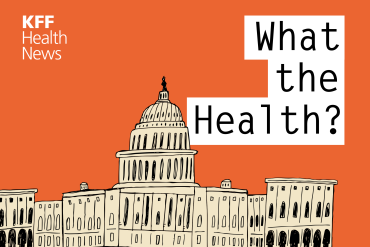Young Gay Latinos See Rising Share of New HIV Cases, Leading to Call for Targeted Funding
Since being diagnosed with HIV in 2022, Fernando Hermida has had to move three times to access treatment. A KFF Health News-Associated Press analysis found gay and bisexual Latino men account for a fast-growing proportion of new diagnoses and infections, showing they are falling behind in the fight against HIV.
Un análisis de KFF Health News-Associated Press halló que los hombres latinos homosexuales y bisexuales representan una proporción cada vez mayor de nuevos diagnósticos e infecciones, lo que demuestra que los están dejando atrás en la lucha contra el VIH.
Journalists Discuss Bird Flu, Tick-Borne Illnesses, and Lessons From Covid Response
KFF Health News and California Healthline staff made the rounds on national and local media in recent weeks to discuss topical stories. Here’s a collection of their appearances.
What the Health? From KFF Health News: Live From Aspen: Health and the 2024 Elections
Health policy may not be the top issue in this year’s presidential and congressional elections, but it’s likely to play a key role. President Joe Biden and Democrats intend to hold Republicans responsible for the Supreme Court’s unpopular ruling overturning the right to abortion, and former President Donald Trump aims to take credit for government efforts to lower prescription drug prices — even in cases in which he played no role. Meanwhile, some critical health care issues, such as those involving Medicaid and the Affordable Care Act, are unlikely to get discussed much, even though the party in power after the elections would control the future of those programs. This week, in an episode taped before a live audience at the Aspen Ideas: Health festival in Aspen, Colorado, Margot Sanger-Katz of The New York Times and Sandhya Raman of CQ Roll Call join KFF Health News’ Julie Rovner to discuss these issues and more.
Super Bowl Parade Shooting Survivors Await Promised Donations While Bills Pile Up
Families of the people hurt during the Feb. 14 mass shooting are carrying what one expert calls “victimization debt.” In the third story of our series “The Injured,” we learn about the strain of paying small and large medical bills and other out-of-pocket costs.
Los costos médicos para los sobrevivientes del tiroteo son muy altos y no terminarán pronto. Según un estudio de la Escuela de Medicina de Harvard, el gasto médico promedio para alguien que recibió un disparo se eleva a casi $30,000 el primer año.
‘We’re Flying Blind’: CDC Has 1M Bird Flu Tests Ready, but Experts See Repeat of Covid Missteps
Three months into the U.S. bird flu outbreak, only 45 people have been tested. Laboratories that are the foundation of diagnostic testing have yet to get approval to detect the bird flu virus. They say their path forward has been slowed by miscommunication and uncertainty from the CDC and FDA.
Montana Creates Emergency ‘Drive-Thru’ Blood Pickup Service for Rural Ambulances
The network is aimed at helping rural patients, who face higher rates of traumatic injuries and death but may not live near a hospital with a stockpile of blood.
Muchos adultos jóvenes que empezaron a vapear de adolescentes no pueden dejar el hábito
El marketing de las empresas de cigarrillos electrónicos, que promocionan atractivos nombres con sabores frutales similares a los caramelos, llevó a muchos adolescentes a probar el vapeo.
Indiana Weighs Hospital Monopoly as Officials Elsewhere Scrutinize Similar Deals
If Indiana officials approve a proposed hospital merger in western Indiana in the coming months, the state will have its first hospital monopoly created by a “Certificate of Public Advantage.” Other such deals have resulted in government reports documenting diminished care in Tennessee and North Carolina.
Funding Instability Plagues Program That Brings Docs to Underserved Areas
A medical residency program designed to train future primary care physicians in outpatient rather than hospital settings has proved an effective means to bring doctors to rural and underserved areas. But it hinges on unpredictable congressional funding.
Many Young Adults Who Began Vaping as Teens Can’t Shake the Habit
New data on substance use among young adults suggests that many former teen e-cigarette users are continuing the habit.
Bird Flu Tests Are Hard To Get. So How Will We Know When To Sound the Pandemic Alarm?
If widely used, flu tests could be helpful now. In the meantime, the government needs to clear a path for H5N1 tests, researchers warn, to avoid the early missteps of the covid pandemic.
Las pruebas para la gripe aviar son difíciles de conseguir. ¿Cómo saber si estamos en una pandemia?
Muchos laboratorios de diagnóstico están capacitados para detectar el virus. Sin embargo, la burocracia, los problemas de facturación y la falta de inversión no permiten aumentar rápidamente la disponibilidad generalizada de pruebas.
Leyes que protegen a trabajadores de California del calor extremo ayudarían a estudiantes
Estas mismas normas se extenderán a las escuelas, donde profesores, conserjes, quienes atienden las cafeterías y otros empleados suelen trabajar sin aire acondicionado, igual que sus alumnos.
Heat Rules for California Workers Would Also Help Keep Schoolchildren Cool
Proposed state standards to protect indoor workers from extreme heat would extend to schools. The rules come as climate change is bringing more frequent and intense heat waves, causing schools nationwide to cancel instruction.
Thousands of Children Got Tested for Lead With Faulty Devices: What Parents Should Know
Faulty lead test kits made by Magellan Diagnostics may have been used as late as 2021 to test children for exposure to the toxic metal. The company agreed to pay $42 million to settle criminal charges that it concealed malfunctions.
Es el último capítulo de una larga saga que involucra a Magellan Diagnostics, con sede en Massachusetts, que pagará $42 millones en multas, según el Departamento de Justicia.
Investigan si los armadillos son responsables de la propagación de la lepra en Florida
La región central de Florida es un foco crítico de esta antigua enfermedad, lo que desconcierta a los científicos que están analizando el fenómeno.
White House Enlists Doctors and Hospitals To Combat Gun Violence
As Congress remains deadlocked on gun policy, the Biden administration is calling on hospital leaders and doctors to gather more data about gunshot injuries and deaths and step up their violence prevention work.





















